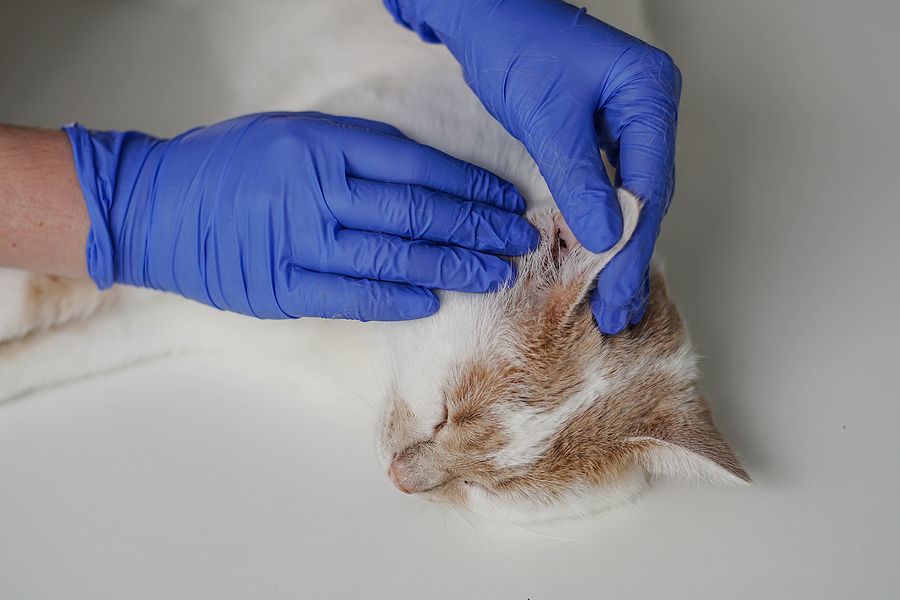While uncommon, it is possible for cats to get ear infections. If your cat does get an ear infection, it is critical to seek prompt treatment because the underlying cause can be serious and ultimately lead to hearing loss or death if left untreated.
Be sure to take your cat to the vet if you think it may have an ear infection. If your cat passes for any reason, Midlands Pet Care offers compassionate options for end-of-life planning. We can help you with your pet memorials.
In this article, we’ll explore the signs/symptoms of ear infections in cats, as well as the common causes and treatments.
Signs/Symptoms of Feline Ear Infections
Typically, when cats get ear infections, they scratch/paw at the affected ear or shake/tilt their head in the direction of the pain. Some of the other common symptoms are:
- Yellow/black discharge
- Strong odor
- Redness/swelling of the ear canal or ear flap
- Waxy buildup on/near the ear canal
- Loss of balance/disorientation
- Hearing loss
- Discharge from the ear that looks like coffee grounds
Causes of Feline Ear Infections
There are many reasons why cats get ear infections. For example, certain predisposing factors include abnormal ear shape, excessive wax production, small ear canals, and excessive ear hair. Another reason that cats get ear infections is ear mites, which are common in kittens and outdoor cats. Allergies may also cause ear inflammation and infection.
Sometimes cats get ear infections due to secondary, opportunistic infections such as bacteria and yeast. Healthy ear canals can fight off/defend against the overgrowth of bacteria and yeast. However, this ability is lost if the canal is diseased.
Some other common secondary causes include:
- Foreign bodies
- Skin disorders
- Aggressive ear cleaning
- Polyps
- Endocrine disorders
- Sebaceous gland disorders
- Inappropriate treatments/medications not intended for use in the ear
- Cancer
- Immune-mediated disorders
Diagnosing and Treating Feline Ear Infections
If your cats get ear infections, prompt diagnosis and treatment are critical for the best outcome.
There are several methods for diagnosing feline ear infections, including:
- Cytology, involves swabbing the affected ear to collect discharge, cells, and debris- which will be examined under a microscope.
- Culturing the affected ear, involves inserting a swab into the ear to obtain a sample of bacteria- which will be grown in a lab and tested against other bacteria to determine which type your kitty is sensitive to.
- Imaging/other testing, if your cat has chronic ear problems or if they do not respond to treatment.
The primary goal of treatment is to address the underlying cause of the infection, as well as secondary infections. Often, cold laser therapy will be used as well as medications designed to ease pain and decrease inflammation.
- If ear mites are the cause of your cat’s ear infections, topical medications will typically be recommended.
- If allergies are the cause of your cat’s ear infections, the first step is to figure out what they are allergic to. Then, a vaccine will be used to treat the allergies.
- If bacteria/yeast are the cause of your cat’s ear infections, your vet will typically recommend an ear drop with antibiotic, anti-inflammatory, and anti-fungal properties, which will usually need to be administered up to twice daily for 7 to 10 days.
Let Midlands Pet Care Memorialize Your Cat
If addressed early, most of the time, you can clear up the ear infection and your cat can live a long, healthy life. Unfortunately, if not addressed early, the infection could spread, and you could lose your cat.
If this happens, Midlands Pet Care can help. We offer a variety of end-of-life plans for your pet. We can help you memorialize your cat in a way that is respectful and dignified.

